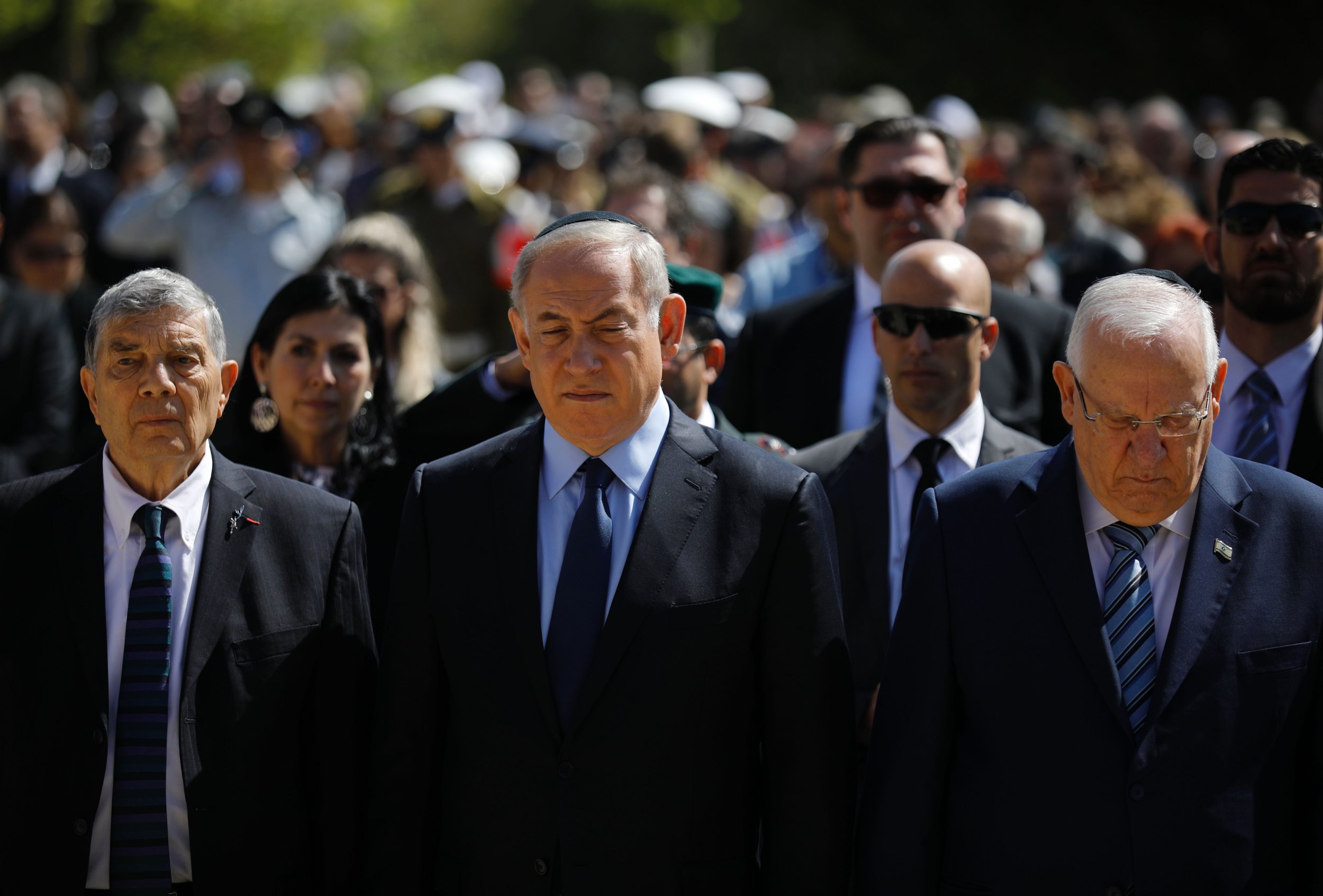
As the sun set on Sunday eve in Tel Aviv, the last open stores and restaurants began shuttering their establishments. The 24/7 food markets, the coffee shops—kosher and non-kosher alike—slowly turned off the lights closed their doors, as the workers and proprietors left for the night. Traffic on the busy streets slowly quieted.
It is not Yom Kippur, when Israel comes to a complete halt for 25 hours, but one of the two other times—both secular memorial days—that Tel Aviv and all of Israel comes to a near halt. Sunday at 8 p.m. began Yom HaShoah v'HaGevura, Israel's official memorial to the martyrs and heroes of the Holocaust.
During the day on Sunday, two very different events took place in Israel. Here in Tel Aviv, an 18-year-old Palestinian attacked four people; his weapon of choice—wire cutters. The attacker only succeeded in causing minor injuries to the four people he assaulted before being subdued.
Also on Sunday, about 100 miles to the South, at the Israel Air Force base of Nevatime, three F-35 jets landed—the most advanced fighter planes in the world. These joined the first two F-35s that arrived in December.
Like everything else in this complicated country, today's events can be seen through very different glasses—i.e., Look how terrible the situation is: They are always trying to kill us; or, look, they try to attack us with wire-cutters and we have F-35s.
In many ways, the country's understanding of the Holocaust can be seen through these two prisms, and those prisms were very much on display at the annual Holocaust memorial services held at Yad Vashem, Sunday night.
Related: Is Trump a closet Holocaust denier? What about his followers?
A speech by President Reuven "Ruvi" Rivlin first attacked those who see the Holocaust as just "one in a string of genocides in the world, without attaching a specific nature to the Jewish aspect of the Holocaust." Then Rivlin attacked all those in Israel who see everything through the lens of the Holocaust.
Rivlin stated:
I had a disagreement with my mentor, Menachem Begin, of blessed memory. On the eve of the IDF's entry into Lebanon in June 1982, Begin said to me, and I quote, "The alternative to the IDF's entry into Lebanon is Treblinka, and we decided that there would never be another Treblinka."
According to this approach, the justification for the existence of the State of Israel is the prevention of the next Holocaust. Every threat is a threat to survival, every Israel-hating leader is Hitler. According to this approach, the essence of our collective Jewish identity is escape from massacre by joint means.
And the world is divided into two, the "Righteous among the nations" on the one hand and anti-Semitic Nazis on the other. And in any case, any criticism of the State of Israel is anti-Semitism. This approach also is fundamentally wrong, and is dangerous for us a nation and as a people.
No less than this, it is dangerous for the memory of the Shoah. There is no doubt that in the period since the Shoah we have stood at historic crossroads, moments when we have sensed the threat of "The Destruction of the Third Temple", and of course the State of Israel may find itself under threat to its very existence.
However, we have a state, we have an army. This approach is dangerous to us both internally and externally. Internally, it obscures the richness of the Jewish existence of before the Shoah. But the Jewish People were not born in Auschwitz. It was not fear that kept us going through two thousand years of exile, it was our spiritual assets, our shared creativity.
Externally, this approach damages our ability to develop relations with the nations of the world and with our critics from a safe place, appropriate for dialogue. We need to ask ourselves whether, when we are involved only in preventing a Shoah, are we capable of most effectively meeting the various challenges that face us?
The Shoah is permanently branded in our flesh. Each of us has a number on our arm. Nevertheless, the Shoah is not the lens through which we should examine our past and our future.
In contrast, Prime Minister Benjamin Netanyahu began his remarks stating that new evidence has shown the Allies knew the full extent of the Holocaust in 1942. Moreover, if they had attacked the death camps repeatedly, starting then, they could have saved 4 million Jews.
Dani Dayan: Support for Israel must not become partisan
Unfortunately, the Prime Minister seems to be ignoring a few pertinent facts. Most importantly, it was only in 1944 that the Allies had the physical ability to reach and bomb the camps. And even then, once they had the technical ability, the end result would be very much in question.
Netanyahu indicted the "superpowers" who were fighting Hitler "for not doing anything." Netanyahu went on to say—in what can only be characterized as a dark speech—that the three causes of the Holocaust were: anti-Semitism; the indifference of the world to the plight of the Jews; and the powerlessness of the Jewish people.
Netanyahu went on to state that nothing has changed. "The hatred of the Jews is not directed towards the state of the Jews." When it comes to the indifference of the world, the answer, Netanyahu stated, "is mostly a negative answer." The world has not changed.
The only thing that has changed, according to Netanyahu, is the power of the Jewish people to defend itself. Netanyahu made it clear he looks at the world through the very lens President Rivlin warns against employing.
So much of Israeli politics today can be understood by listening to the speeches of these two men. Interestingly enough, both are long time members of the LIkud party and born to parents who were involved in the revisionist Zionist movement (the right-wing party led by Ze'ev Jabotinsky).
However, one man—the prime minister—sees Hitlers around every corner and behind every rock, while the other—President Rivlin—sees a strong nation, which may have some enemies, but enemies from whom we need not fear for our existence.
It's ironic that Netanyahu, the American-educated politician who is considered by many Israelis to be a strong leader, has embraced a Jewish, diaspora mentality of fear, while Rivlin, who has always been popular but has is never considered to have a strong personality and who has lived his entire life in Jerusalem, has become the representative of the strong Israeli, confident in his role in the world—i.e., someone who had learned the lessons of the Holocaust but does not visualize another mass slaughter around every corner.
President Rivlin ended his address, suggesting a different approach:
Holocaust remembrance and the lessons to be learned are founded on three central pillars: "We shall always undertake our own defense; the shared common Jewish destiny; 'Beloved is man, for he was created in God's image.'"
As Rivlin explained, it was the Holocaust that taught the Jewish people that they must always be ready to defend themselves and that Israel has a responsibility towards Jews worldwide.
The Holocaust also bequeathed to Jews the responsibility for speaking out whenever a potential slaughter of innocents might be taking place. Navigating these sometimes contradicting responsibilities has always been and remains a challenge.
As President Rivlin said: "We cannot remain silent in face of the horrors being committed far away from us, and certainly those happening just across the border."
Amen, from Tel Aviv.
Marc Schulman is a multimedia historian.
Uncommon Knowledge
Newsweek is committed to challenging conventional wisdom and finding connections in the search for common ground.
Newsweek is committed to challenging conventional wisdom and finding connections in the search for common ground.
About the writer
To read how Newsweek uses AI as a newsroom tool, Click here.








